Deadly harvest: The Lebanese fields sown with cluster bombs
Lebanese villagers must risk death in fields 'flooded' with more than a million Israeli cluster bombs - or leave crops to rot
By Patrick Cockburn in Nabatiyeh
Published: 18 September 2006
 The war in Lebanon has not ended. Every day, some of the million bomblets which were fired by Israeli artillery during the last three days of the conflict kill four people in southern Lebanon and wound many more.
The war in Lebanon has not ended. Every day, some of the million bomblets which were fired by Israeli artillery during the last three days of the conflict kill four people in southern Lebanon and wound many more.
The casualty figures will rise sharply in the next month as villagers begin the harvest, picking olives from trees whose leaves and branches hide bombs that explode at the smallest movement. Lebanon's farmers are caught in a deadly dilemma: to risk the harvest, or to leave the produce on which they depend to rot in the fields.
[snip]
Some Israeli officers are protesting at the use of cluster bombs, each containing 644 small but lethal bomblets, against civilian targets in Lebanon. A commander in the MLRS (multiple launch rocket systems) unit told the Israeli daily Haaretz that the army had fired 1,800 cluster rockets, spraying 1.2 million bomblets over houses and fields. "In Lebanon, we covered entire villages with cluster bombs," he said. "What we did there was crazy and monstrous." What makes the cluster bombs so dangerous is that 30 per cent of the bomblets do not detonate on impact. They can lie for years - often difficult to see because of their small size, on roofs, in gardens, in trees, beside roads or in rubbish - waiting to explode when disturbed.
[snip]
"For us, the war is still going on, though there was a cease-fire on 14 August," said Dr Hassan Wazni, the director of the hospital. "If the cluster bombs had all exploded at the time they landed, it would not be so bad, but they are still killing and maiming people."
The bomblets may be small, but they explode with devastating force. On the morning of the ceasefire, Hadi Hatab, an 11-year old boy, was brought dying to the hospital. "He must have been holding the bomb close to him," Dr Wazni said. "It took off his hands and legs and the lower part of his body."
[snip]
Israeli bombs and shells have turned about a third of the houses in Yohmor into concrete sandwiches, one floor falling on top of another under the impact of explosions. Some families camp in the ruins. Villagers said that they were most worried by the cluster bombs still infesting their gardens, roofs and fruit trees. In the village street, were the white vehicles of the Manchester-based Mines Advisory Group (MAG), whose teams are trying to clear the bomblets.
It is not an easy job. Whenever members of one of the MAG teams finds and removes a bomblet, they put a stick, painted red on top and then yellow, in the ground. There are so many of these sticks that it looks as if some sinister plant had taken root and is flourishing in the village.
[snip]
Frederic Gras, a de-mining expert formerly in the French navy, who is leading the MAG teams in Yohmor, says: "In the area north of the Litani river, you have three or four people being killed every day by cluster bombs. The Israeli army knows that 30 per cent of them do not explode at the time they are fired so they become anti-personnel mines."
Why did the Israeli army do it? The number of cluster bombs fired must have been greater than 1.2 million because, in addition to those fired in rockets, many more were fired in 155mm artillery shells. One Israeli gunner said he had been told to "flood" the area at which they were firing but was given no specific targets. M. Gras, who personally defuses 160 to 180 bomblets a day, says this is the first time he seen cluster bombs used against heavily populated villages.
An editorial in Haaretz said that the mass use of this weapon by the Israeli Defence Forces was a desperate last-minute attempt to stop Hizbollah's rocket fire into northern Israel. Whatever the reason for the bombardment, the villagers in south Lebanon will suffer death and injury from cluster bombs as they pick their olives and oranges for years to come.

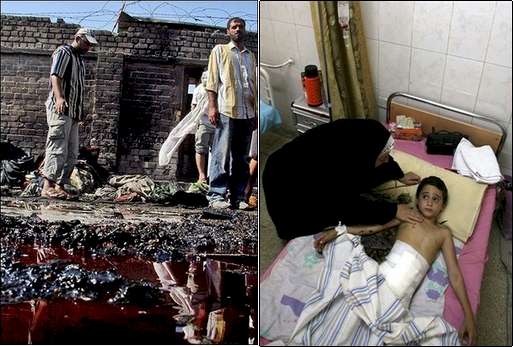
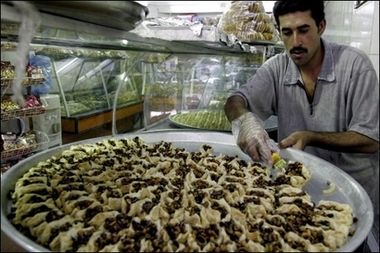 The photograph to the left shows some sweets. My childhood memorys of Ramadan are very happy ones. Children before the age of puberty are of course exempt from fasting. And in any case as a foreigner, and a Christian, living in Lebanon I was even more exempt. But it was considered polite not to stuff your face in public during the fast. In the evening I got lots of chances to eat my self silly and did. I don't think there was ever a Ramadan evening that we ate at home. We lived in a mostly Muslim area, we were the only Christians in two blocks. All our neighbours used to invite us to come and share their evening meal with us after the first year they worked out a rota of who would invite us on which evening so that nobody felt left out. The Lebanese are very hospitable anyway but we were made to feel even more welcome than usual. For me the main meal would usually end with me being brought from one house to another so that I could sample the various desserts. I quickly learnt that it was a good idea to fast a bit during the day anyway or else my stomach would run out of space long before I'd had a chance to try everything.
The photograph to the left shows some sweets. My childhood memorys of Ramadan are very happy ones. Children before the age of puberty are of course exempt from fasting. And in any case as a foreigner, and a Christian, living in Lebanon I was even more exempt. But it was considered polite not to stuff your face in public during the fast. In the evening I got lots of chances to eat my self silly and did. I don't think there was ever a Ramadan evening that we ate at home. We lived in a mostly Muslim area, we were the only Christians in two blocks. All our neighbours used to invite us to come and share their evening meal with us after the first year they worked out a rota of who would invite us on which evening so that nobody felt left out. The Lebanese are very hospitable anyway but we were made to feel even more welcome than usual. For me the main meal would usually end with me being brought from one house to another so that I could sample the various desserts. I quickly learnt that it was a good idea to fast a bit during the day anyway or else my stomach would run out of space long before I'd had a chance to try everything.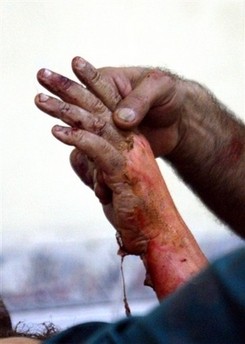 Two civilians were killed and 11 wounded this morning in a car bomb attack in Hurriyah northern Baghdad.
Two civilians were killed and 11 wounded this morning in a car bomb attack in Hurriyah northern Baghdad. 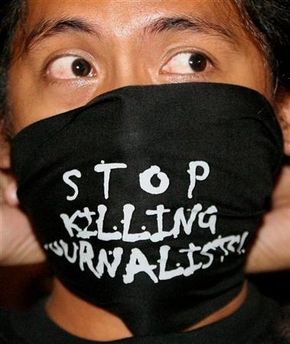
 The war in Lebanon has not ended. Every day, some of the million bomblets which were fired by Israeli artillery during the last three days of the conflict kill four people in southern Lebanon and wound many more.
The war in Lebanon has not ended. Every day, some of the million bomblets which were fired by Israeli artillery during the last three days of the conflict kill four people in southern Lebanon and wound many more.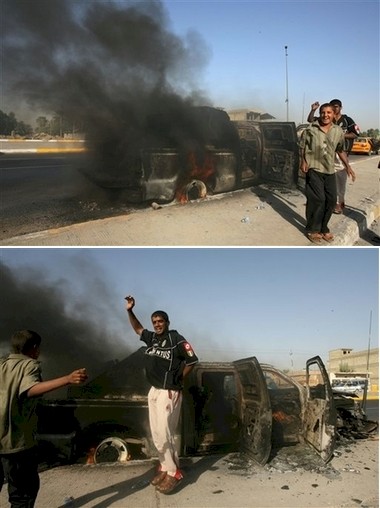 The captions supplied with these two photographs are very revealing:
The captions supplied with these two photographs are very revealing: